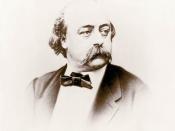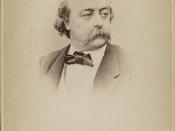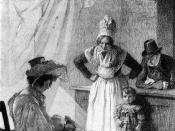Madame Bovary Passage
ABut it was above all at mealtime that she could bear it no longer - in that small ground floor room with its smoking stove, its squeaking door, its sweating walls and its damp floor tiles. All the latterness of life seemed to be served up to her on her plate; and the steam rising from the boiled meat brought gusts of revulsion from the depths of her soul. Charles was a slow eater; she would nibble a few hazelnuts or lean on her elbow and draw lines on the oilcloth with the point of her table knife.@(73)
The preceding passage illustrates Gustave Flaubert=s beliefs in portraying both realism and romanticism in his characters, as well as his usage of symbols and point of view changes to describe the bourgeoisie. When Flaubert says, AAll the bitterness of life seemed to be served up to her on her plate,@ he uses Emma=s dinner as a symbol of her ordinary, lower middle class life.
The Aboiled meat@ symbolizing the raw, disgusting truth that Emma is not the rich upper class woman she longs to be brings Agusts of revulsion from the depths of her soul.@ The passage also illustrates certain realist beliefs as seen in the expression Aits squeaking door, its sweating walls, and its damp floor tiles.@ In this sentence, Flaubert describes realistically the ugly but true minute details of the room. The passage also illustrates Flaubert using different points of view, a technique that Flaubert uses throughout the novel. Flaubert describes the room as Emma sees it, with Asweating walls and its damp floor tiles@. The dark depressed tone reflects Emma=s feelings about her ordinary and boring life. Flaubert then goes on to describe Emma=s boredom with her life and her marriage by showing her...


